- Home // Product // Porsche 991 Turbo
Porsche 991 Turbo
Acceleration Time : 60-130mph Reduced By 0.2 seconds
Fitment: Porsche 991.1 991.2 Turbo, Turbo S
The 991 Turbo Eventuri intake system was developed through extensive real world testing with the aim of allowing the turbos to work more efficiently. By replacing the single stock airbox with individual patented Venturi filter housings, the turbos are able to spool and generate boost with less drag. As a result, the wastegate duty cycles are reduced resulting in peak boost at lower RPM and therefore performance is increased. The two individual filters provide a larger filtration area as compared to the single stock panel filter. Furthermore, in order to keep inlet air temperatures down, the Venturi housings are sealed against an air duct which draws ambient air from the same location as the stock system. Since the 911 Turbo engine bay is densely packed, high IATs can only be avoided by ensuring a fully sealed intake system. The combination of a smoother airflow path to each turbo with low IATs results in higher performance and a sharper throttle response over the stock airbox.
The Eventuri Difference
The 911 Turbo Eventuri system uses our Patented Carbon Fibre Housings with our Gen 2 bespoke filters, which provide an aerodynamically efficient airflow path from the filter to the turbos. Not just another cone filter with a heat shield but a unique design which invokes the Venturi affect and maintains laminar flow conditions to reduce the drag on the turbo. You can read more about the housing design and how it works HERE.
The intake was tested on the road using a Vbox unit to record the acceleration from 60-130mph . Testing was carried out on the same stretch of road - again on the same day to keep variables minimum. Results show that with just the intake added - on stock software, the acceleration times from 60-130mph reduced by 0.2 seconds which is a significant improvement at such speeds.
Acceleration results summary:
The gains are from a combination of reasons:
1) Individual Venturi Housings separate the flow path for each turbo allowing them to work more efficiently.
2) The Venturi housings provide a smooth transition from the filter to the intake tubes keeping airflow laminar.
3) Intake air temperatures are kept to a minimum by ensuring a sealed system to prevent pulling in heated engine bay air.


Acceleration results summary:
- 60-130mph with Stock intake = 8.04 seconds
- 60-130mph with Eventuri intake = 7.83 seconds
The gains are from a combination of reasons:
1) Individual Venturi Housings separate the flow path for each turbo allowing them to work more efficiently.
2) The Venturi housings provide a smooth transition from the filter to the intake tubes keeping airflow laminar.
3) Intake air temperatures are kept to a minimum by ensuring a sealed system to prevent pulling in heated engine bay air.


Part Numbers:

The Eventuri 991 Turbo intake system consists of a number of components engineered to perform a specific purpose and fabricated to the highest of standards. Here are the details for each component and the design ethos behind them:
Each intake system consists of:

INTAKE HOUSING ASSEMBLY
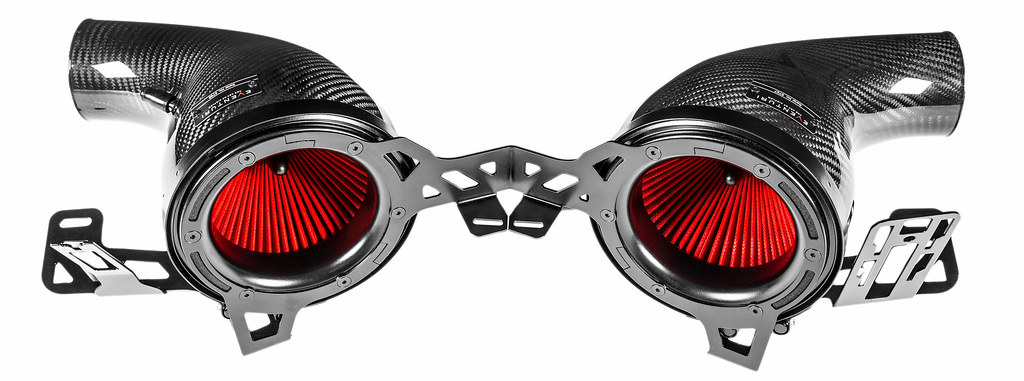
The filter housings comprise of our bespoke generation 2 filters, aluminium inlet cowls, the carbon pods and integrated tubes. The carbon pods shroud the reverse mounted filters and smoothly shape the airflow down to the stock turbo inlet tubes. By separating the inlet path and having a dedicated filter for each turbo, the intake allows the turbos to function more efficiently. Crucially, the Venturi housings organically extend with a smooth curve from the filter opening to the stock turbo tubing. This ensures that the airflow remains as smooth as possible throughout the system. Smooth airflow results in less drag and therefore the turbos can reach peak boost sooner in the RPM range. It also means that the throttle response feels sharper.
PATENTED TECHNOLOGY
Our patented filter housings have a smooth reduction in cross sectional area as they shroud the filters and taper down to the tubing. This geometry invokes the Venturi effect where the airflow accelerates whilst maintaining laminar conditions. It can be thought of as a large velocity stack - below is a diagram to show the comparison between our patented design and a regular intake system. Our bespoke filters aid the airflow moving through the housings and allow for an even velocity profile as the airflow exits the housings. Further details can be read in the Technology and Filters pages.
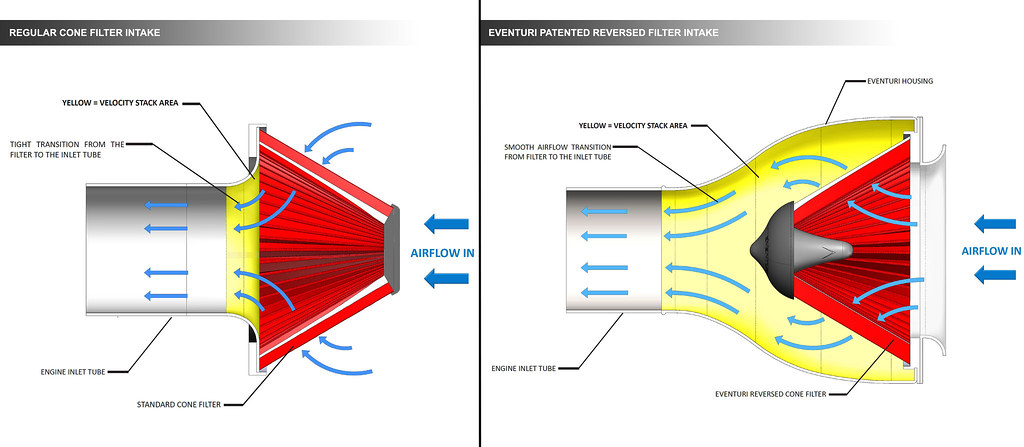
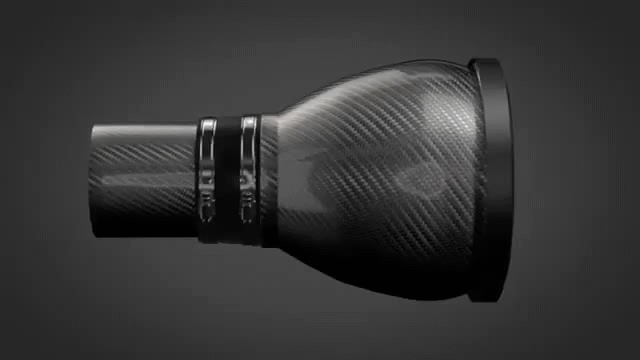
INTAKE DUCT
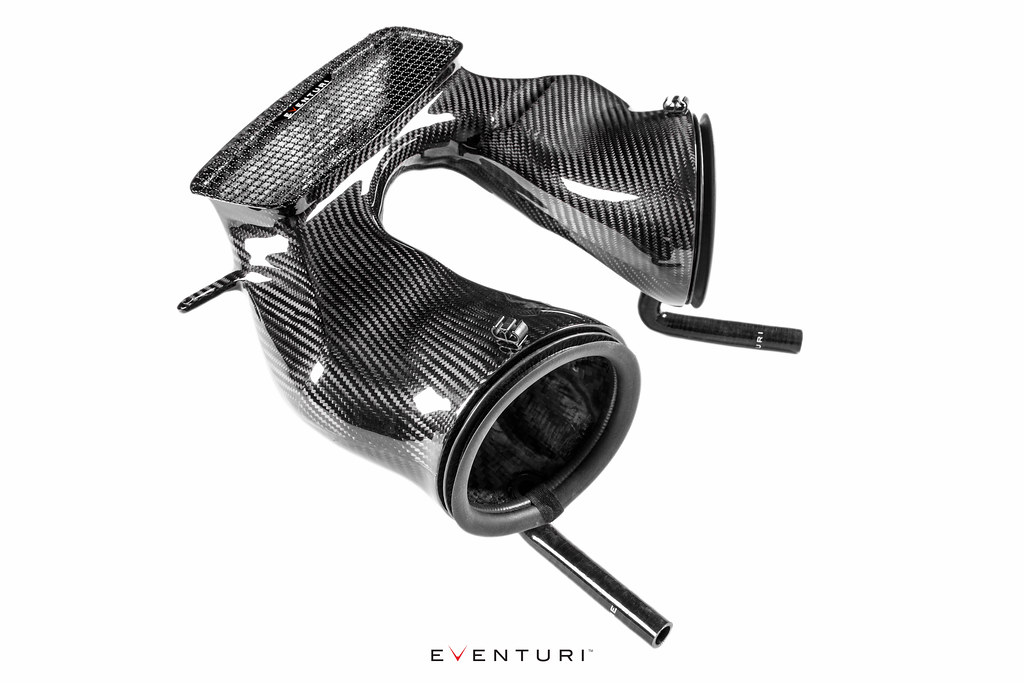
The intake duct seals against the underside of the boot-lid using the stock rubber cushion and then extends down to seal against the filter housings. Crafted from 100% prepreg carbon fiber the intake duct ensures that the intake pulls in ambient air only and not heated engine bay air. Again in order to maximise flow efficiency the transition from the circular openings for the filter housings to the single air entry point is as smooth as possible. The duct also features 2 drain tubes which direct water away from the filters. The tubes are designed such that the intakes will draw a minimum amount of air from within the engine bay due to the larger flow resistance in the tubes as compared to the opening at the top of the duct. The complex geometry of the duct was necessary to clear the various components in the engine bay of the 991 Turbo.

BRACKET WORK

The brackets are laser cut from stainless steel and powder coated. We went to great lengths to ensure that the intakes have a precision fitment using the stock airbox mounting locations. The brackets not only brace the intakes to the chassis but also allow engine components to be secured as they are with the stock airbox. In order to save weight, each bracket has purposely shaped cutouts which remove material yet allow the overall structure to remain rigid.
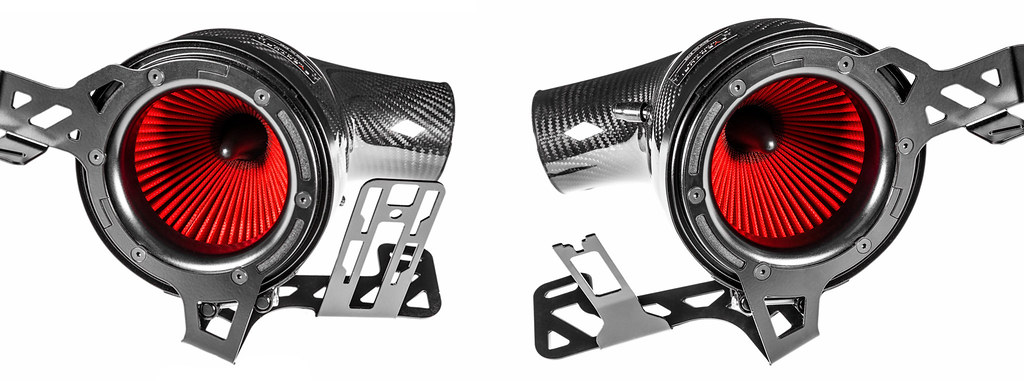
The complete system comes together to provide an audible and noticeable performance improvement over the stock airbox system.

- EVE-P991T-INT : Porsche 991 Turbo Black Carbon intake

The Eventuri 991 Turbo intake system consists of a number of components engineered to perform a specific purpose and fabricated to the highest of standards. Here are the details for each component and the design ethos behind them:
Each intake system consists of:
- 2 x Carbon Fiber Venturi Housings with Integrated Tubes
- 2 x Bespoke High Flow Generation 2 Filters
- 2 x Aluminium Inlet Cowls
- Carbon Fiber inlet duct
- Laser Cut Stainless Steel bracket work

INTAKE HOUSING ASSEMBLY

The filter housings comprise of our bespoke generation 2 filters, aluminium inlet cowls, the carbon pods and integrated tubes. The carbon pods shroud the reverse mounted filters and smoothly shape the airflow down to the stock turbo inlet tubes. By separating the inlet path and having a dedicated filter for each turbo, the intake allows the turbos to function more efficiently. Crucially, the Venturi housings organically extend with a smooth curve from the filter opening to the stock turbo tubing. This ensures that the airflow remains as smooth as possible throughout the system. Smooth airflow results in less drag and therefore the turbos can reach peak boost sooner in the RPM range. It also means that the throttle response feels sharper.
PATENTED TECHNOLOGY
Our patented filter housings have a smooth reduction in cross sectional area as they shroud the filters and taper down to the tubing. This geometry invokes the Venturi effect where the airflow accelerates whilst maintaining laminar conditions. It can be thought of as a large velocity stack - below is a diagram to show the comparison between our patented design and a regular intake system. Our bespoke filters aid the airflow moving through the housings and allow for an even velocity profile as the airflow exits the housings. Further details can be read in the Technology and Filters pages.


INTAKE DUCT

The intake duct seals against the underside of the boot-lid using the stock rubber cushion and then extends down to seal against the filter housings. Crafted from 100% prepreg carbon fiber the intake duct ensures that the intake pulls in ambient air only and not heated engine bay air. Again in order to maximise flow efficiency the transition from the circular openings for the filter housings to the single air entry point is as smooth as possible. The duct also features 2 drain tubes which direct water away from the filters. The tubes are designed such that the intakes will draw a minimum amount of air from within the engine bay due to the larger flow resistance in the tubes as compared to the opening at the top of the duct. The complex geometry of the duct was necessary to clear the various components in the engine bay of the 991 Turbo.

BRACKET WORK

The brackets are laser cut from stainless steel and powder coated. We went to great lengths to ensure that the intakes have a precision fitment using the stock airbox mounting locations. The brackets not only brace the intakes to the chassis but also allow engine components to be secured as they are with the stock airbox. In order to save weight, each bracket has purposely shaped cutouts which remove material yet allow the overall structure to remain rigid.

The complete system comes together to provide an audible and noticeable performance improvement over the stock airbox system.

991 intake 991 turbo intake 991 turbo s intake 991.1 intake 991.1 turbo intake 991.2 intake 991.2 turbo intake porsche 991.1 turbo intake porsche 991.1 turbo S intake porsche 991.2 turbo intake porsche 991.2 turbo s intake porsche turbo intake








